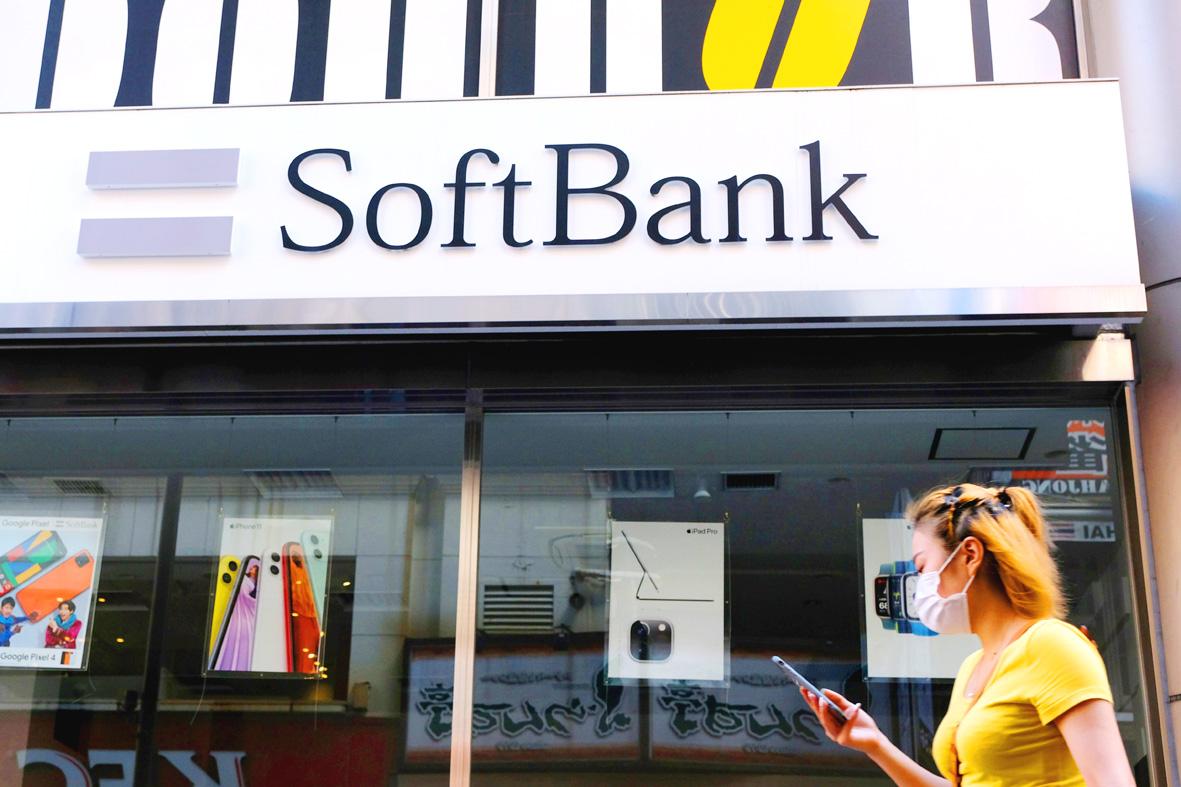Softbank Group Corp yesterday reported a US$12 billion quarterly net profit to June, recovering from eye-watering losses as tech stocks rally and the firm sheds assets to shore up its finances.
The results would be a relief for chairman Masayoshi Son, who has faced an increasing drumbeat of criticism after record losses for the firm. Softbank holds stakes in some of Silicon Valley’s hottest start-ups through its US$100 billion Vision Fund.
The 11.9 percent rise in net profit to ¥1.26 trillion (US$11.86 billion) puts Softbank back in the black after a turbulent financial year that saw its investment woes magnified by the COVID-19 pandemic and plunges in global stock markets.

Photo: AFP
Son has insisted that his strategy is sound and that Softbank’s portfolio is broad enough to weather the storm, but acknowledged the challenges when the firm reported an eye-watering US$8.9 billion annual net loss in May, hit by the WeWork debacle and stock crashes.
The results come after Softbank launched an aggressive plan to sell up to US$41 billion in assets to finance a stock buyback, after Son said that shares were undervalued.
The fundraising was also intended to reduce the firm’s debts and increase cash reserves.
Softbank shares closed down 2.45 percent to ¥6,361 shortly before the results were announced, up significantly from their March low of ¥2,687.
The company also reported ¥983 billion in investment gains for the quarter to June, including profit from its Vision Fund.
However, Softbank said that the pandemic continued to cause uncertainty, bolstering its investments in e-commerce and food delivery firms, but hammering those in the hotel and hospitality sectors.
The firm said that it would not offer a forecast “due to numerous uncertainties affecting earnings.”
Son has struggled to interest investors in a second round of the Vision Fund, as he deals with the woes of some of his most high-profile investments, notably WeWork.
Once hailed as a dazzling unicorn valued at US$47 billion, the office-sharing start-up has suffered a stunning fall from grace.
Son stood by his investment, even upping his stake, but things began to unravel last year as WeWork hemorrhaged cash and canceled its share offering, with founder Adam Neumann pushed out.
Softbank this year scrapped a plan to buy up to US$3 billion WeWork shares as part of a restructuring program, and the start-up is suing for alleged breach of contract.

Semiconductor shares in China surged yesterday after Reuters reported the US had ordered chipmaking giant Taiwan Semiconductor Manufacturing Co (TSMC, 台積電) to halt shipments of advanced chips to Chinese customers, which investors believe could accelerate Beijing’s self-reliance efforts. TSMC yesterday started to suspend shipments of certain sophisticated chips to some Chinese clients after receiving a letter from the US Department of Commerce imposing export restrictions on those products, Reuters reported on Sunday, citing an unnamed source. The US imposed export restrictions on TSMC’s 7-nanometer or more advanced designs, Reuters reported. Investors figured that would encourage authorities to support China’s industry and bought shares

TECH WAR CONTINUES: The suspension of TSMC AI chips and GPUs would be a heavy blow to China’s chip designers and would affect its competitive edge Taiwan Semiconductor Manufacturing Co (TSMC, 台積電), the world’s biggest contract chipmaker, is reportedly to halt supply of artificial intelligence (AI) chips and graphics processing units (GPUs) made on 7-nanometer or more advanced process technologies from next week in order to comply with US Department of Commerce rules. TSMC has sent e-mails to its Chinese AI customers, informing them about the suspension starting on Monday, Chinese online news outlet Ijiwei.com (愛集微) reported yesterday. The US Department of Commerce has not formally unveiled further semiconductor measures against China yet. “TSMC does not comment on market rumors. TSMC is a law-abiding company and we are

FLEXIBLE: Taiwan can develop its own ground station equipment, and has highly competitive manufacturers and suppliers with diversified production, the MOEA said The Ministry of Economic Affairs (MOEA) yesterday disputed reports that suppliers to US-based Space Exploration Technologies Corp (SpaceX) had been asked to move production out of Taiwan. Reuters had reported on Tuesday last week that Elon Musk-owned SpaceX had asked their manufacturers to produce outside of Taiwan given geopolitical risks and that at least one Taiwanese supplier had been pushed to relocate production to Vietnam. SpaceX’s requests place a renewed focus on the contentious relationship Musk has had with Taiwan, especially after he said last year that Taiwan is an “integral part” of China, sparking sharp criticism from Taiwanese authorities. The ministry said

US President Joe Biden’s administration is racing to complete CHIPS and Science Act agreements with companies such as Intel Corp and Samsung Electronics Co, aiming to shore up one of its signature initiatives before US president-elect Donald Trump enters the White House. The US Department of Commerce has allocated more than 90 percent of the US$39 billion in grants under the act, a landmark law enacted in 2022 designed to rebuild the domestic chip industry. However, the agency has only announced one binding agreement so far. The next two months would prove critical for more than 20 companies still in the process